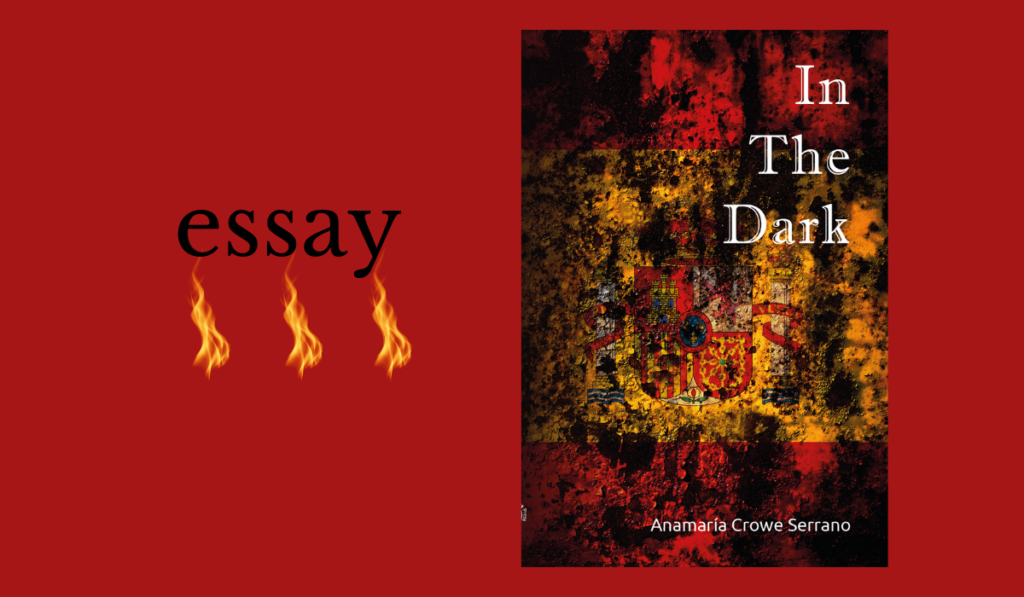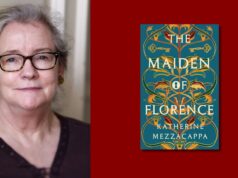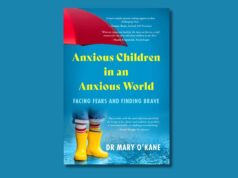
by Anamaría Crowe Serrano
The idea of writing In the Dark (Turas Press) originally stemmed from something I had difficulty reconciling for myself. My Spanish grandfather, who spent much time with me in Spain when I was a child, and whom I loved dearly, fought for Franco in the Spanish Civil War. It wasn’t spoken about much at home, although the impression I always got was that having fought for Franco was something good.
History lessons in school in Ireland, however, left me wondering. The narrative there was that Franco was a Fascist and a dictator who had thwarted the Republicans—who were on the right side of history. They, after all, had been defending democracy and the injustice of skewed land ownership.
According to our history book, it followed that anyone who fought for Franco must be some kind of monster. Yet my own sense of my grandfather was at odds with this narrative.
My childhood experience taught me that not all of those who fought for Franco were violent, evil, or held intolerant views. Some, like my grandfather, were sensitive, creative people, educators with a strong sense of their own humility who cared very much about social injustice. This polarity of views puzzled me.
On the few occasions that I asked my grandfather about the war, he was evasive, handing me history books where he said I would find everything I wanted to know. It was clear he didn’t want to talk about it, so I stopped asking, but my interest in understanding why a man such as he would have chosen to fight on the Fascist side niggled away at me.
I thought of writing a book about him, in the hope that this would give me answers, but for years I couldn’t find a way in.
Then I saw a documentary at the Instituto Cervantes in Dublin called “30 años de oscuridad” (30 years of darkness), about a man who hid during the Spanish Civil War to avoid conscription. He remained in hiding for decades afterwards, afraid of being caught and killed by the Franco regime.
The thought of such a man hiding in a tiny space with only his wife knowing his whereabouts, as he watched life unfold through a small hole in the wall, unable to have any contact with his family, fired my imagination. The man I was imagining wasn’t exactly the man in the documentary. I didn’t really know who he was until one day I just started writing from his point of view.
To my surprise, the story of In the Dark began to emerge, the story of a man, his wife, her sister and their children taking refuge from the war in the house where he is hiding in the cramped space under the stairs. It wasn’t a story about my grandfather, after all, but the questions I wanted answered began to take shape through the characters. The sisters themselves are in conflict, with opposing political views and personal tensions that play out even though they try to keep them in check so they can live under the one roof.
Research is the best part of writing a historical novel. You think you have a fairly good idea about a historical period, but the more you delve into your material, the more you realise that nothing is as simple as you had been led to believe.
Everything is nuanced and multi-faceted. It’s so easy to fall into the comfortable, catchy soundbites and slogans of politics, but we risk ignoring the larger picture if we do that. The work of historians such as Anthony Beevor, Paul Preston and Nigel Townson, among others, opened my eyes to the fact that the Republican government that had been elected in February 1936 in Spain was not as committed to democracy as I had thought. Soon after the election, the government splintered into its many constituent leftist factions, which George Orwell famously lists in his Homage to Catalonia.
With that split came internal power struggles and disagreement over how some of the Republic’s reforms should be implemented. Violence within the factions erupted on such an appalling scale, it became known as the Red Terror. It’s not something that is widely mentioned, but my research began to offer an explanation as to why many Spanish people (almost half of the population) felt the country was descending into chaos during the Republic, and why something, or someone, needed to put a stop to the situation.
One of the key materials I used to structure the novel was the Republican newspapers of the time, La Vanguardia. I set the novel during the battle of Teruel (Dec 15th 1937 – Feb 22nd 1938) because my grandfather fought in that area during one of the coldest winters on record. I inserted details from La Vanguardia for almost every day of the battle into the short scenes that make up the novel.
The extensive diaries of Chilean diplomat Carlos Morla Lynch, who stayed in Madrid throughout the war, also provided contemporary accounts of what it was like to live in a war zone. It was fascinating to see through these sources how some semblance of daily life continued despite the suffering, such as what items could be bought with ration cards, the resourceful ways people coped with lack of food and heat, how the evacuation of children to France was progressing, personal ads placed by widows looking for a good husband, what people did for entertainment.
With the benefit of hindsight, I could also see how biased the newspaper was in its reporting.
Every edition, in fact, carried the censor’s stamp of approval. It must have been almost impossible for people during the war to have a comprehensive idea of what was happening. That raised many questions about the concept of truth, not just in relation to events but how we understand other people, what we think we know about them. The idea of multiple truths gave me the idea for the ending of the novel, which I won’t spoil here. Suffice to say that everything the characters believe is turned on its head. As the saying goes, there’s your version of events, my version of events—and the truth somewhere in the middle.
In The Dark will be released by Turas Press in June 2021, and is available here.
Anamaría Crowe Serrano is an Irish writer, translator and editor born in Dublin to an Irish father and a Spanish mother. She grew up bilingually, straddling cultures, in Co. Meath and did her schooling in Trim. The long summer months were spent in Spain with her grandparents and maternal relatives. Her poetry and prose has been published internationally and anthologised in Ireland and abroad. Anamaría has translated many works of poetry and novels from Spanish and Italian into English. Her poetry collections include Femispheres; One Columbus Leap; OnWords and UpWords and Crunch – published by Turas Press in 2018. In the Dark is her first published novel, which she has spent several years researching and writing.












